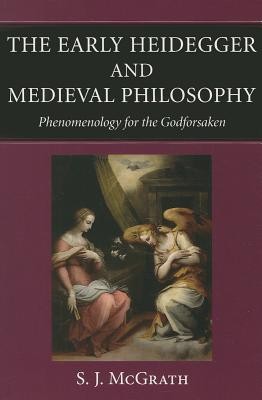
- We will send in 10–14 business days.
- Author: S J McGrath
- Publisher: Catholic University of America Press
- ISBN-10: 0813221870
- ISBN-13: 9780813221878
- Format: 15 x 22.6 x 1.8 cm, softcover
- Language: English
- SAVE -10% with code: EXTRA
The Early Heidegger and Medieval Philosophy Phenomenology for the Godforsaken (e-book) (used book) | bookbook.eu
Reviews
Description
The Early Heidegger and Medieval Philosophy is a major interpretive study of Heidegger's complex relationship to medieval philosophy. S. J. McGrath's contribution is historical and biographical as well as philosophical, examining how the enthusiastic defender of the Aristotelian-Scholastic tradition became the great destroyer of metaphysical theology. This book provides an informative and comprehensive examination of Heidegger's changing approach to medieval sources--from the seminary studies of Bonaventure to the famous phenomenological destructions of medieval ontology. McGrath argues that the mid-point of this development, and the high point of Heidegger's reading of medieval philosophy, is the widely neglected habilitation thesis on Scotus and speculative grammar. He shows that this neo-Kantian retrieval of phenomenological moments in the metaphysics of Scotus and Thomas of Erfurt marks the beginning of a turn from metaphysics to existential phenomenology. McGrath's careful hermeneutical reconstruction of this complex trajectory uncovers the roots of Heidegger's critique of ontotheology in a Luther-inspired defection from his largely Scholastic formation. In the end McGrath argues that Heidegger fails to do justice to the spirit of medieval philosophy. The book sheds new light on a long-debated question of the early Heidegger's theological significance. Far from a neutral phenomenology, Heidegger's masterwork, Being and Time, is shown to be a philosophically questionable overturning of the medieval theological paradigm.
EXTRA 10 % discount with code: EXTRA
The promotion ends in 19d.23:42:40
The discount code is valid when purchasing from 10 €. Discounts do not stack.
- Author: S J McGrath
- Publisher: Catholic University of America Press
- ISBN-10: 0813221870
- ISBN-13: 9780813221878
- Format: 15 x 22.6 x 1.8 cm, softcover
- Language: English English
The Early Heidegger and Medieval Philosophy is a major interpretive study of Heidegger's complex relationship to medieval philosophy. S. J. McGrath's contribution is historical and biographical as well as philosophical, examining how the enthusiastic defender of the Aristotelian-Scholastic tradition became the great destroyer of metaphysical theology. This book provides an informative and comprehensive examination of Heidegger's changing approach to medieval sources--from the seminary studies of Bonaventure to the famous phenomenological destructions of medieval ontology. McGrath argues that the mid-point of this development, and the high point of Heidegger's reading of medieval philosophy, is the widely neglected habilitation thesis on Scotus and speculative grammar. He shows that this neo-Kantian retrieval of phenomenological moments in the metaphysics of Scotus and Thomas of Erfurt marks the beginning of a turn from metaphysics to existential phenomenology. McGrath's careful hermeneutical reconstruction of this complex trajectory uncovers the roots of Heidegger's critique of ontotheology in a Luther-inspired defection from his largely Scholastic formation. In the end McGrath argues that Heidegger fails to do justice to the spirit of medieval philosophy. The book sheds new light on a long-debated question of the early Heidegger's theological significance. Far from a neutral phenomenology, Heidegger's masterwork, Being and Time, is shown to be a philosophically questionable overturning of the medieval theological paradigm.


Reviews